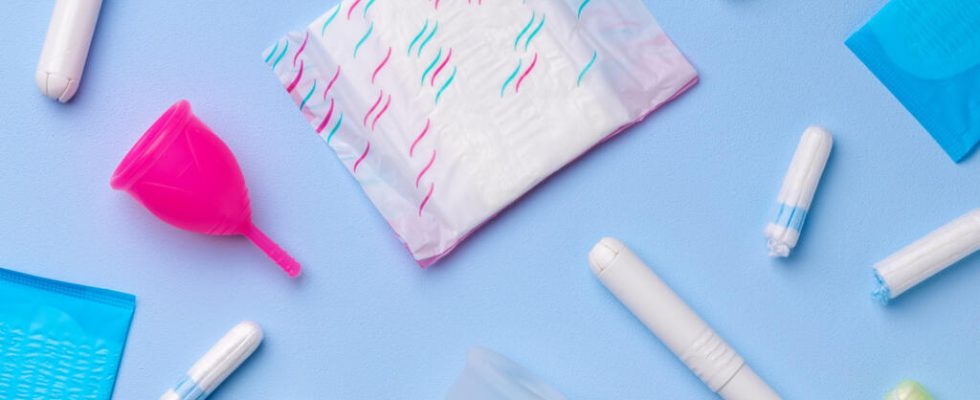On July 1st in France, a decree plans to require manufacturers of pads and tampons to display the components of their products on packaging or instructions. Except that for the associations which have been mobilizing for years to demand more transparency, the final version of the text ” is completely emptied of its substance ‘, and appears as ‘ a reverse gear “.
It was a promise from the former Minister of Health, now spokesperson for the French government, Olivier Véran. “ Every woman will know what’s in her tampon or pad “, he promised in March 2022. The initial idea: to put an end to the opacity which reigns over the composition of menstrual protection, in order to preserve the health of women.
The former minister guaranteed the registration of ” everything that makes up tampons, sanitary napkins and menstrual cups on the packaging. Exhaustive information which had to appear in a way indelible, visible, understandable and in the French language », according to the words of Olivier Véran, in ReleaseLast year.
A year later, this decree will finally see the light of day. THE JDD revealed contours this Saturday, May 27. And as several associations note, the government seems to have lowered its ambitions.
A decree that arouses outrage »
After round trips in 2022 between the State services and the three associations (Elementary Rules, the Women’s Foundation, and the Georgette Sand collective) which have been campaigning with the government on this issue since 2020, the final text of the decree has indeed enough to disappoint consumers.
Because, subtlety: this future decree will only mention the obligation to display the added substances ” intentionally by manufacturers, i.e. perfumes or inks. “ There will not be a complete list of all the substances that can be found in the protections, in particular toxic, contaminated products, which are for example present in the raw materials. It’s a huge disappointment for us “, regrets Laury Gaube, director of communication of the association Rules Elementary.
Other point ” aberrant »: manufacturers will be able to include the list of ingredients on the instructions inside the packages, and not on the outer packaging. ” The will of the decree should be to allow consumers to make an informed choice at the time of purchase, and to be able to compare products. Today it is impossible. The person will only realize once they open the package that the protection actually contained dangerous products “, abounds Laury Gaube.
The scope of application will also be reduced, since according to the indications of the JDD, textile protection, i.e. washable menstrual panties, will be exempted from this obligation. Once again, it’s a cold shower for the NGOs. ” It takes at least 80% of textile fibers for a product to be qualified as a textile product. And so are tampons and pads. So there is, in addition, the risk that some manufacturers invoke this argument and are exempt from listing the composition », alert Basic Rules. Currently, no regulations around the washable protection market are in force, while the craze for these products continues to grow.
A “disinterest” in the subject of menstruation
On the occasion of world menstrual hygiene daySunday, May 28, the three associations together launched the campaign #DisplayYourCompo. All accompanied of a petitiontitled ” For real transparency on the composition of periodic protection », which currently has more than 11,000 signatories. The objective: to alert public opinion to this public health issue and encourage the government to propose a more ambitious decree.
As Elementary Rules reminds us, menstruating people use on average “ 10,000 tampons and pads during menstruation in a lifetime “, either “ 4 billion protections each year “. In 2017, the Directorate General for Competition, Consumer Affairs and Fraud Prevention (DGCCRF) reported in a report the presence of ” chemical residues pesticides or hydrocarbons in several brands of tampons and towels.
A glaring lack of information on the components of menstrual products that Rules Elementary interprets as a lack of interest in the subject on the part of public authorities, researchers and manufacturers. Especially since to date, no study has brought any concrete conclusion on the impact of these substances. “ There is no research on the subject because there is no transparent information on the compositions. It’s an infernal loop that shows that the taboo of periods is still present “, indignant Laury Gaube.
Classify menstrual products according to quality
Beyond the raw composition of the packets, “ the idea is also to allow consumers to be able to decipher which ingredients are or are not dangerous to health. “For this, the three associations imagine that once the list of substances has been made public, applications, like Yuka, could scan the periodic protections and, in the long term, “ propose a rating system to classify products according to their quality, as is already done for food or cosmetics “says Laury Gaube.
Elementary Rules, the Women’s Foundation, and the Georgette Sand collective continue to hope for measures that live up to their expectations. Ideally, a decree that would succeed in forcing manufacturers to have a complete and accessible composition on the packets, to then allow analyzes to be carried out on the effects of these ingredients. And finally, prevent the most harmful while promoting the manufacture of more ethical period protection.
Read also : “I put diapers instead”: faced with menstrual precariousness, some women are forced to use the D system
